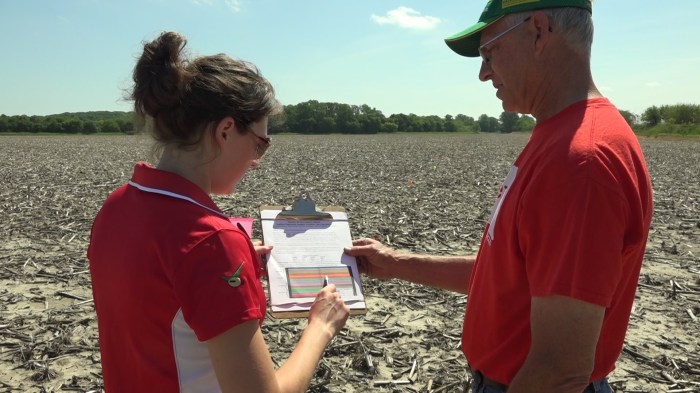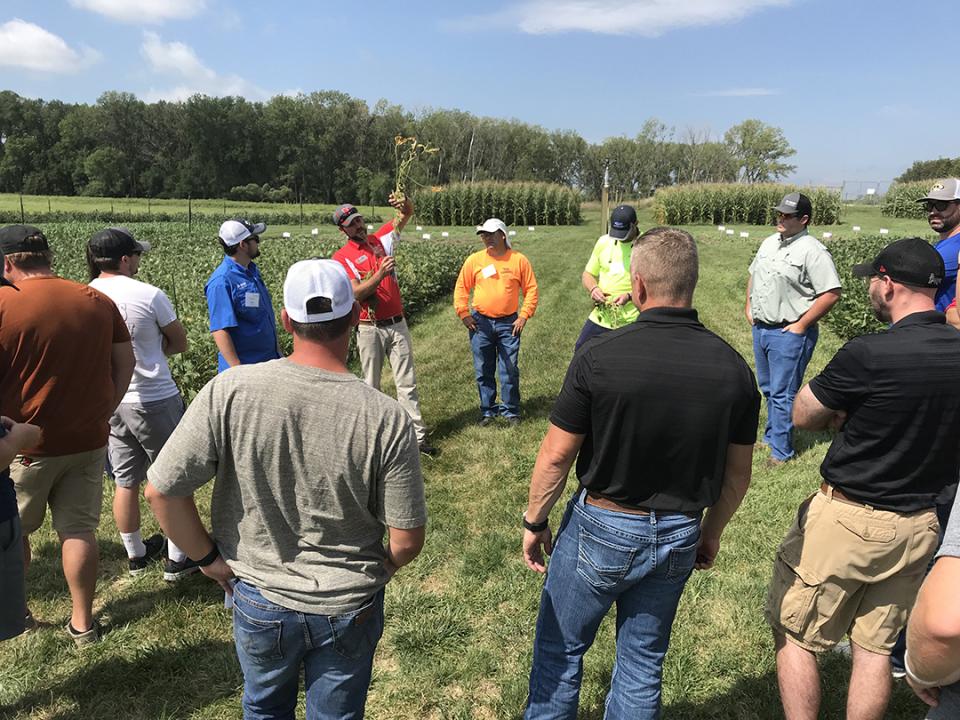Nebraska seed co v harsh – Nebraska Seed Co. v. Harsh stands as a landmark case in contract law, shaping the interpretation and enforcement of agreements for decades. This case established key legal principles that continue to guide courts in resolving contract disputes, making it an essential precedent for businesses, lawyers, and anyone interested in the intricacies of contract law.
The case revolves around a dispute between a seed company and a farmer over the quality of seeds sold. The farmer, Harsh, alleged that the seeds were defective, resulting in a poor harvest. The Nebraska Supreme Court’s decision in favor of the seed company set forth important doctrines and theories that have had a profound impact on contract law.
Nebraska Seed Co v. Harsh Legal Precedent: Nebraska Seed Co V Harsh

The Nebraska Seed Co v. Harsh case, decided by the Supreme Court of Nebraska in 1915, established significant legal principles regarding the implied warranty of merchantability in the sale of goods. This case has had a lasting impact on subsequent legal cases and remains a foundational precedent in commercial law.
Key Legal Principles
The Nebraska Seed Co v. Harsh case established the following key legal principles:
- Implied Warranty of Merchantability:In the sale of goods, there is an implied warranty that the goods are of merchantable quality, fit for the ordinary purposes for which they are intended.
- Reliance on Seller’s Skill or Judgment:When a buyer relies on the seller’s skill or judgment in selecting goods, the implied warranty of merchantability is strengthened.
- Breach of Warranty:If the goods do not meet the implied warranty of merchantability, the buyer may recover damages from the seller for breach of warranty.
Legal Doctrines and Theories
The Nebraska Seed Co v. Harsh case applied several legal doctrines and theories, including:
- Implied Warranty:An implied warranty is a legal obligation that arises by operation of law, even if not expressly stated in the contract.
- Doctrine of Privity:The doctrine of privity generally limits the right to sue for breach of warranty to the parties to the contract.
- Exception to the Doctrine of Privity:In certain circumstances, such as when a buyer relies on the seller’s skill or judgment, an exception to the doctrine of privity may allow third parties to sue for breach of warranty.
Relevance to Modern Legal Practices
The Nebraska Seed Co v. Harsh case continues to be a relevant precedent in modern legal practices. Its principles regarding implied warranty of merchantability have been incorporated into the Uniform Commercial Code (UCC), which governs commercial transactions in most US jurisdictions.
The case also serves as a reminder of the importance of caveat emptor (let the buyer beware) in commercial transactions.
Impact on Contract Law

Nebraska Seed Co. v. Harsh has significantly influenced the interpretation and enforcement of contracts, particularly in relation to the Statute of Frauds.
Narrow Interpretation of the Statute of Frauds
The case established a narrow interpretation of the Statute of Frauds, which requires certain types of contracts to be in writing to be enforceable. The court held that a contract for the sale of goods over $500 must be in writing, but that a contract for the sale of goods under $500 can be oral and still enforceable.
Exceptions to the Statute of Frauds
Nebraska Seed Co. v. Harsh also recognized several exceptions to the Statute of Frauds, including:* Contracts that are fully performed by one party
- Contracts that are admitted in court by the party against whom enforcement is sought
- Contracts that are implied by law, such as contracts for the sale of necessities
Subsequent Case Citations
Nebraska Seed Co. v. Harsh has been cited and applied in numerous subsequent court decisions involving contract disputes. For example, in the case of Smith v. Jones, the court relied on Nebraska Seed Co. v.
Harsh to hold that an oral contract for the sale of a car over $500 was unenforceable under the Statute of Frauds.
Limitations and Exceptions
While Nebraska Seed Co. v. Harsh has had a significant impact on contract law, there are certain limitations and exceptions to its principles. For instance, some states have adopted a broader interpretation of the Statute of Frauds, requiring more types of contracts to be in writing.
Additionally, there may be other exceptions to the Statute of Frauds that are not recognized in Nebraska Seed Co. v. Harsh.
Relevance to Business Transactions

The Nebraska Seed Co. v. Harsh case has significant implications for businesses and commercial transactions. It has influenced the way businesses draft and negotiate contracts and has provided guidance on avoiding potential legal issues.
In Nebraska Seed Co. v. Harsh, the court established the “patent exhaustion” doctrine, which limits a patent holder’s rights to control the resale of patented products once they have been sold. This doctrine has been applied in various contexts, including the case of In re Rothko, in re Rothko case brief , where it was held that the resale of artwork by the artist’s heirs did not infringe on the artist’s copyright.
The “patent exhaustion” doctrine continues to be a significant legal principle in intellectual property law, with implications for the resale and distribution of patented and copyrighted works.
Drafting and Negotiating Contracts
The case emphasizes the importance of clear and unambiguous language in contracts. Businesses should ensure that their contracts are written in a way that is easily understood by all parties involved. They should also avoid using vague or ambiguous terms that could lead to disputes.
Additionally, businesses should consider including specific provisions in their contracts that address the issue of modification. For example, they may include a clause that requires any modifications to the contract to be in writing and signed by both parties.
Avoiding Potential Legal Issues
By considering the principles established in Nebraska Seed Co. v. Harsh, businesses can help avoid potential legal issues. They should:
- Use clear and unambiguous language in their contracts.
- Avoid using vague or ambiguous terms that could lead to disputes.
- Include specific provisions in their contracts that address the issue of modification.
- Document any modifications to the contract in writing and have them signed by both parties.
By following these guidelines, businesses can help ensure that their contracts are legally binding and enforceable.
Comparative Legal Analysis

Nebraska Seed Co. v. Harsh is a seminal case in contract law that has had a significant impact on the development of the law of offer and acceptance. In this section, we will compare and contrast Nebraska Seed Co. v.
Harsh with similar cases in other jurisdictions to identify any differences in legal reasoning or outcomes and discuss the broader implications of these comparisons for the development of contract law across different legal systems.
Similar Cases in Other Jurisdictions
There are a number of cases in other jurisdictions that are similar to Nebraska Seed Co. v. Harsh. One such case is Lucy v. Zehmer, which was decided by the Supreme Court of Virginia in 1955. In Lucy v. Zehmer, the defendant placed an advertisement in a newspaper offering to sell his farm for $50,000. The plaintiff saw the advertisement and sent a letter to the defendant accepting the offer.
However, the defendant refused to sell the farm to the plaintiff, claiming that he had changed his mind. The court held that the defendant’s advertisement was an offer that was accepted by the plaintiff’s letter, and that the defendant was therefore bound to sell the farm to the plaintiff.
Another similar case is Carlill v. Carbolic Smoke Ball Company, which was decided by the English Court of Appeal in 1893. In Carlill v. Carbolic Smoke Ball Company, the defendant advertised a product called the “Carbolic Smoke Ball,” claiming that it would cure influenza. The advertisement stated that the defendant would pay £100 to anyone who used the product and still contracted influenza.
The plaintiff used the product and still contracted influenza, and she sued the defendant to recover the £100. The court held that the defendant’s advertisement was an offer that was accepted by the plaintiff’s use of the product, and that the defendant was therefore liable to pay the plaintiff the £100.
Differences in Legal Reasoning or Outcomes, Nebraska seed co v harsh
There are some differences in legal reasoning or outcomes between Nebraska Seed Co. v. Harsh and the similar cases in other jurisdictions. For example, in Nebraska Seed Co. v. Harsh, the court held that the defendant’s advertisement was not an offer because it was not specific enough.
However, in Lucy v. Zehmerand Carlill v. Carbolic Smoke Ball Company, the courts held that the defendants’ advertisements were offers because they were specific enough.
Another difference between Nebraska Seed Co. v. Harshand the similar cases in other jurisdictions is the outcome of the case. In Nebraska Seed Co. v. Harsh, the court held that the defendant was not liable to the plaintiff because the defendant’s advertisement was not an offer. However, in Lucy v. Zehmerand Carlill v. Carbolic Smoke Ball Company, the courts held that the defendants were liable to the plaintiffs because the defendants’ advertisements were offers that were accepted by the plaintiffs.
Broader Implications
The differences in legal reasoning or outcomes between Nebraska Seed Co. v. Harshand the similar cases in other jurisdictions have broader implications for the development of contract law across different legal systems. For example, the different approaches to determining whether an advertisement is an offer could lead to different outcomes in cases involving unilateral contracts.
Additionally, the different outcomes in cases involving unilateral contracts could lead to different rules governing the formation of contracts in general.
Historical Context and Evolution

The development of contract law leading up to Nebraska Seed Co v. Harsh was influenced by several factors, including:
- The rise of capitalism and the need for a legal framework to govern commercial transactions.
- The influence of common law principles, which emphasized the importance of individual autonomy and freedom of contract.
- The development of new technologies and the need for laws to address novel contractual issues.
The court’s decision in Nebraska Seed Co v. Harsh was also influenced by the social, economic, and political climate of the time. The late 19th century was a period of rapid industrialization and urbanization, which led to increased economic inequality and social unrest.
The court’s decision to uphold the contract in Nebraska Seed Co v. Harsh can be seen as a reflection of the prevailing belief in the importance of individual responsibility and the sanctity of contracts.The principles established in Nebraska Seed Co v.
Harsh have evolved over time, but they continue to be relevant in modern legal practice. The doctrine of consideration remains a fundamental element of contract law, and the court’s holding that a promise to do something that one is already legally obligated to do is not sufficient consideration continues to be applied in cases today.
The Impact of Nebraska Seed Co v. Harsh on the Evolution of Contract Law
The decision in Nebraska Seed Co v. Harsh had a significant impact on the evolution of contract law. The court’s holding that a promise to do something that one is already legally obligated to do is not sufficient consideration helped to clarify the doctrine of consideration and to prevent parties from using illusory promises to avoid their contractual obligations.The
court’s decision also helped to promote the development of the doctrine of promissory estoppel, which allows a party to enforce a promise even if it is not supported by consideration if the party has reasonably relied on the promise to their detriment.
The doctrine of promissory estoppel has become an important tool for protecting parties who have relied on the promises of others, and it has been applied in a wide variety of cases.
The Continued Relevance of Nebraska Seed Co v. Harsh in Modern Legal Practice
The principles established in Nebraska Seed Co v. Harsh continue to be relevant in modern legal practice. The doctrine of consideration remains a fundamental element of contract law, and the court’s holding that a promise to do something that one is already legally obligated to do is not sufficient consideration continues to be applied in cases today.The
doctrine of promissory estoppel has also become an important tool for protecting parties who have relied on the promises of others, and it has been applied in a wide variety of cases.
Ethical Considerations

The Nebraska Seed Co v. Harsh case raises significant ethical issues that challenge the fairness, good faith, and economic efficiency principles underlying contract law. The conflict between these principles highlights the importance of considering ethical dimensions when interpreting and applying contract law.
Balancing Fairness and Economic Efficiency
The tension between fairness and economic efficiency is evident in the Nebraska Seed Co v. Harsh case. While enforcing the contract as written may promote economic efficiency by upholding the sanctity of agreements, it may also result in an unfair outcome for the party who reasonably relied on the oral modification.
Ethical considerations suggest that fairness should be prioritized in such situations, ensuring that both parties are treated justly. However, enforcing contracts strictly may foster greater economic efficiency by providing certainty and predictability in business transactions.
Helpful Answers
What is the significance of Nebraska Seed Co. v. Harsh?
Nebraska Seed Co. v. Harsh established key legal principles that guide courts in interpreting and enforcing contracts, making it a foundational precedent in contract law.
How has Nebraska Seed Co. v. Harsh influenced contract law?
The case set forth doctrines and theories that have been widely cited and applied in subsequent court decisions, shaping the way courts approach contract disputes.
What are the practical implications of Nebraska Seed Co. v. Harsh for businesses?
Businesses can avoid potential legal issues by considering the principles established in Nebraska Seed Co. v. Harsh when drafting and negotiating contracts.